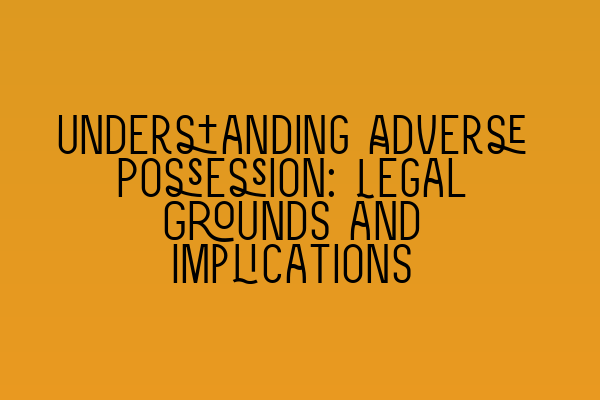Understanding Adverse Possession: Legal Grounds and Implications
Welcome to the SQE Property Law & Land Law blog. In this article, we will delve into the concept of adverse possession, exploring its legal grounds and implications in the UK. Adverse possession is a topic that often sparks curiosity and confusion, but with our expert guidance, you will gain a thorough understanding of this complex area of property law.
But first, let’s define adverse possession. It refers to a situation where someone who is not the legal owner of a property claims ownership based on their continuous and exclusive possession of the land for a specified period. This allows them to acquire title to the property, even if they do not have the original owner’s consent.
Understanding the legal grounds for adverse possession is crucial. These grounds can vary depending on the circumstances and the jurisdiction within the UK. Generally, adverse possession requires the claimant to demonstrate:
1. Actual Possession: The claimant must physically occupy the property and treat it as their own. This involves using the land, maintaining it, and excluding others from using it during the specified period.
2. Exclusive Possession: The claimant must show that their possession of the land is exclusive, meaning they have sole control and enjoyment of the property without interference from the legal owner.
3. Open and Notorious Possession: The claimant’s possession must be evident and noticeable to others, giving the legal owner a chance to discover the adverse possession claim.
4. Adverse Possession Period: The claimant must satisfy a specific time period to establish adverse possession – typically 10, 12, or 15 years, depending on the circumstances. This uninterrupted possession is a crucial element in claiming ownership.
Once the claimant fulfills these legal grounds, they may have a valid adverse possession claim. However, it’s important to note that adverse possession is not automatically granted. The legal owner can dispute the claim or take legal action to reclaim their property.
Now let’s discuss the implications of adverse possession. It can have significant consequences for both the claimant and the legal owner. For the claimant, successful adverse possession can lead to acquiring legal title to the property. This can be a boon for those who have invested time, effort, and resources into the land, enabling them to enjoy the property’s full benefits and potentially develop it further.
On the other hand, adverse possession raises serious concerns for property owners. The loss of property can be detrimental, particularly if they were unaware of the adverse possession claim. It is crucial for property owners to be proactive in protecting their rights, including regularly monitoring their land and taking legal action if they suspect adverse possession.
To navigate adverse possession successfully, both claimants and legal owners should seek expert legal advice. Knowledgeable solicitors, like our team at SQE Property Law & Land Law, can guide you through the intricate process, providing effective strategies to protect your interests.
In conclusion, understanding adverse possession is vital in the field of property law. By grasping the legal grounds and implications, you can navigate this complex area with confidence. Whether you are a claimant seeking to establish adverse possession or a legal owner safeguarding your property rights, our team at SQE Property Law & Land Law is here to assist you.
For further information and guidance on property practice, consider reading our related articles:
1. SQE Preparation for Property Practice: Mapping Out Your Strategy
2. Updates in UK Property Laws: Key Changes and Implications
3. Legal challenges in property transactions: A comprehensive guide
4. Navigating Lease Laws in the UK: Essential Guidelines for Tenants and Landlords
5. Dominate Property Law Questions: Avoiding Common Pitfalls
Stay tuned for more informative articles on property law and land law from SQE Property Law & Land Law.
